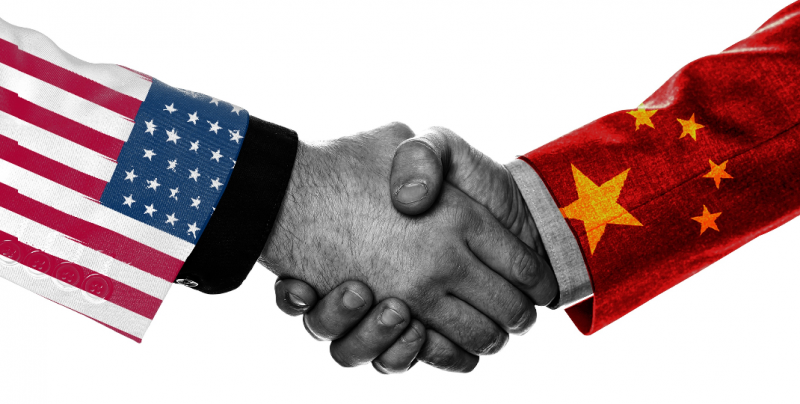
Beijing: Chinese President Xi Jinping said during his meeting with his US counterpart on the sidelines of the Group of 20 summit in Bali, Indonesia, that the current state of US-China relations is not in the fundamental interests of the two countries and peoples, nor is it was what the international community had hoped.
President Joe Biden stressed that "the United States and China must manage competition responsibly and maintain open lines of communication" in order to keep the US-China rivalry from "veering conflict."
Additionally, they agreed that the two countries should "cooperate to address international challenges such as terrorism and climate change" because "this is what the international community expects."
Also Read: Economic ties between China and Canada enter a period of "cold coexistence
To expand the potential for cooperation, Biden and Xi decided to resume a variety of institutionalized bilateral dialogues. Tensions have been high for months before the summit, following a visit to Taiwan by US House Speaker Nancy Pelosi that marked a naval and diplomatic showdown between the two superpowers.
The world welcomed the historic summit in Bali, which appeared to be cordial indeed. The Biden-Xi detente was greeted with relief in Southeast Asia, which has hosted several summits this month.
States in the region were deeply concerned about the economic and geopolitical fallout of the unrestrained rivalry of the US and China as they fiercely competed for strategic preeminence in Southeast Asia.
Given its importance and potential for success, the meeting between Biden and Xi should not have been completely unexpected. On one hand, both the leaders were working with confidence. Biden beat the odds in the midterm elections, while Xi won an unprecedented third term as China's supreme leader.
Biden has become the best-performing Democratic incumbent in more than 50 years, with the party retaining control of the Senate and narrowly missing out on retaining the House. Both leaders felt secure in their home positions and were willing to extend an olive branch.
Prior to his meeting with Xi, Biden upgraded US-Asian relations to a "comprehensive strategic partnership", the highest level of institutionalized bilateral cooperation for ASEAN. Washington agreed that responsible leadership must be demonstrated, particularly in Southeast Asia.
During an impassioned speech at the East Asia Summit in Phnom Penh, Cambodia, Biden vowed to work to "keep the lines of communication open and ensure competition is not fought," according to the White House.
Also Read: Australia clears the Free Trade Agreement with India
A few days later, the G20 summit was hosted by Indonesia, the de facto leader of ASEAN, which helped pave the way for a US-China diplomatic breakthrough. Southeast Asian countries felt some respite from this as the deteriorating Sino-US relations created existential problems at three different levels.
First, the Biden administration's confrontational change in China policy has worried many in ASEAN. Washington recently unveiled its national security and defense strategies, signaling its commitment to its long-term strategic rivalry with China.
The National Defense Strategy refers to China as "America's most consequential strategic competitor for decades to come", while the Security Strategy almost explicitly accuses China of seeking hegemony in the Indo-Pacific region.
ASEAN's concerns about armed conflict in its backyard have only grown as a result of rising superpower tensions and a possible military confrontation over Taiwan.
Additionally, the US is using "integrated deterrence" to counter China's growing naval presence, particularly in the South China Sea, aimed at uniting regional defense allies against Beijing.
Singapore's Deputy Prime Minister Lawrence Wong has issued a warning that the US and China could "sleep-walk into conflict" in light of this dangerous situation.
Southeast Asian countries are also dealing with the negative economic effects of the escalating technological conflict between the two superpowers.
The Biden administration last month implemented sweeping sanctions against China's semiconductor industry, which is essential to the country's cutting-edge industries and long-term economic growth.
ASEAN members are deeply concerned about disruption to the region's supply chains and innovation networks as China is an important trading partner and investor in many of their neighboring countries.
Singapore's Foreign Minister Vivian Balakrishnan recently gave an impassioned speech in which she emphasized the negative effects of technological isolation.
He foresaw mounting threats to "open science, the fair sharing and harvesting of intellectual property, and a system in which we will compete to be most innovative, dependable, and trustworthy" without being forced to choose between the two superpowers, all without specifically mentioning US sanctions.
In the context of technology and investments, he made it clear that no "self-respecting Asian country wants to be trapped, to be a vassal, or, worse, to be a theatre for proxy battles."
However, Asean ultimately welcomed the Sino-American detente because it acknowledges the need for US-China cooperation to address a wide range of impasse-causing issues facing the region. A number of Southeast Asian nations are extremely vulnerable to the effects of terrorism and climate change.
Additionally, the brutal junta in Myanmar is the subject of a broad diplomatic embargo as Southeast Asian leaders consider measures to contain the crisis before it turns into a civil war.
Asean leaders urged "our external partners," like the US and China, to support a peace plan in Myanmar in their most recent joint statement.
States in Southeast Asia would prefer that the two superpowers work together on economic development initiatives rather than compete against one another, particularly given the severity of the infrastructure spending gap in the region.
Also Read: Film Industry: Anurag Thakur says film industry is creative economy
In other words, the future of Asean members is largely dependent on how US-China relations develop in the twenty-first century.